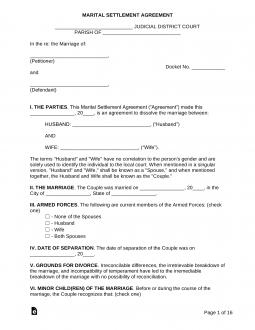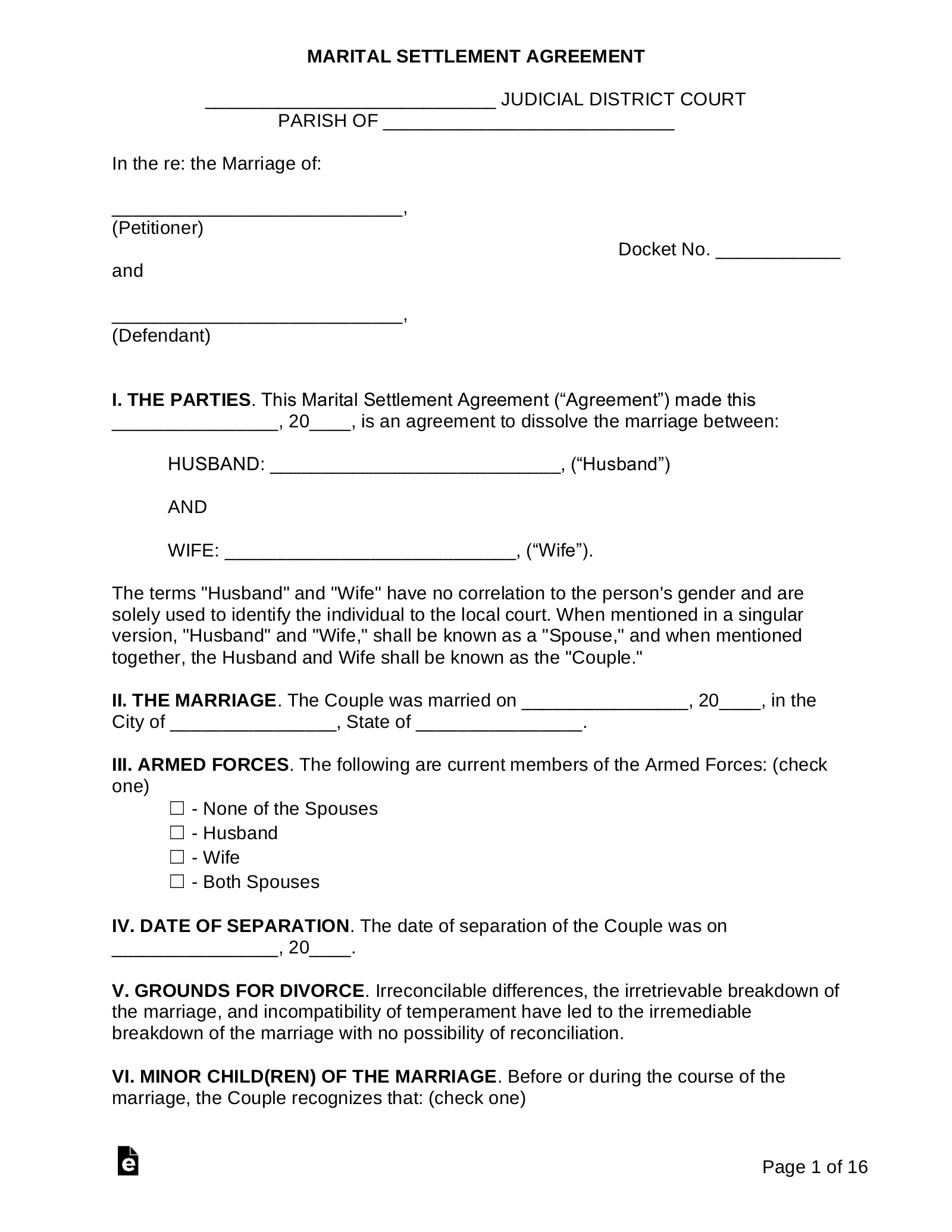Updated September 01, 2023
A Louisiana marital settlement agreement allows couples who are getting divorced to enter into a legally binding arrangement that sets out the terms for the dissolution of their marriage. The contract relays how the spouses will divide their property, assets, debts, and it will detail the allocation of child custody if applicable. By entering into a marital settlement agreement, couples can avoid excessive, costly litigation, and instead have the terms of their divorce ordered by a judge. District courts in the state have unique rules and procedures, so it is recommended that spouses obtain legal counsel from professionals who are familiar with local protocol.
Table of Contents |
Divorce Laws
Statutes:
- Revised Statutes (RS), Title 9 (§ 301 through § 375)
- Civil Code (CC), Articles 102, 103, 103.1, 111, 112, and 113
- Code of Civil Procedure (CCP), Articles 10 and 3941
Alimony (CC Art. 111 and 112) – If a spouse has been found to be without fault in a divorce case, they may be awarded periodic financial support paid for by the other spouse. The court will determine the support amount based on both parties’ income, financial obligations, earning capacity, child custody, educational needs, health, age, duration of the marriage, tax consequences, and history of abuse (if any). The amount cannot exceed one-third of the payer’s net income.
- Alimony Calculator – calculators.law
Child Support (RS § 9:313, § 9:315.2, § 9:315.8, and § 9:315.14) – The court will determine the party responsible for paying child support by reviewing both parties’ net incomes, the amount of time the child will spend with the credited parent, and the child’s best interests. The child support payment amount cannot be less than one hundred dollars ($100).
- Child Support Calculator – WSG Law Firm, Lopresto Law
Division of Property (CC Art. 2338) – Louisiana is a “community property state,” which means that all assets and debts are legally considered to be community property and are equally divided in a divorce case unless the couple enters into a marital settlement agreement.
Grounds for Divorce (RS § 9:307, CC Art. 102, 103, and 103.1) – A petitioner can request a no-fault divorce if they meet the separation requirements (see below); otherwise, to obtain a fault-based divorce, the petitioner must prove that their spouse has committed adultery, has been sentenced to death or imprisonment with hard labor, or abused the petitioner or their children to obtain a fault-based divorce.
Interim Support (CC Art. 113) – Either spouse can submit a motion to receive temporary financial support from the other party during divorce proceedings. If awarded, interim support terminates one hundred eighty (180) days from the date that a divorce judgment is given.
Residency (CCP Art. 10(A)(7), (B) and 3941) – A petition for divorce cannot be filed unless one (1) or both spouses has been a state resident for at least six (6) months.
Separation (CC Art. 102) – To petition for a no-fault divorce, couples must remain separated and not share a residence for at least six (6) months (one-hundred eighty (180) days). If the couple has children, the law requires them to be separated for one (1) year.
Divorce Forms
- Where to File – District Court in Parish of Residence
- Filing Fee – At least $100
- How Long Does it Take? At least thirty (30) days
Uncontested Divorce with No Children:
- Computer Program for Louisiana Divorce Forms
- Petition for Divorce
- Waiver of Service
- Notice of Hearing
- Divorce Judgment
Uncontested Divorce With Children:
- Petition for Divorce
- Waiver of Service
- Notice of Hearing
- Divorce Judgment
Individuals should visit their local District Court’s website to obtain the petition that is intended for use in their parish.
How to File for Divorce in Louisiana (5 steps)
- Meet the Legal Requirements
- Complete and File Divorce Papers
- Serve Defendant
- Marital Settlement Agreement and Notice of Hearing
- Hearing and Judgment
1. Meet the Legal Requirements
To apply for a no-fault divorce, Louisiana law requires one or both spouses to be residents of the state for at least one (1) year and live separately for a minimum of one-hundred eighty (180) days (one (1) year if the couple has children). No separation is required in a fault-based divorce; however, one spouse must have committed adultery, been convicted to death or hard labor for a felony, or abused their spouse or children.
2. Complete and File Divorce Papers

Note: Each District Court has its own procedural rules which should be ascertained prior to beginning legal action.
The spouse filing for divorce will need to fill out a Petition for Divorce and sign the Verification (must be signed and authorized by a notary public). These forms can be obtained from the District Court in the parish that the action will be filed (the parish in which either spouse resides or in which they lived as a married couple). Alternatively, the Computer Program for Louisiana Divorce Forms can be used to complete the necessary documents (for couples without children only.
21st Judicial Court petition examples:
- Petition for Divorce Without Minor Children
- Petition for Divorce With Minor Children
When filing the completed divorce papers, the court clerk will charge the petitioner a fee (fees vary from one parish to another).
3. Serve Defendant
The petitioner must serve a certified copy of the Petition for Divorce on their spouse (the defendant) within ninety (90) days of filing the petition.
There are two (2) accepted methods of service:
- Delivered in person by the petitioner (the defendant must sign a notarized Waiver of Service and file it with the court clerk)
- Delivered by the sheriff’s office for a fee (they will file proof of service after it has been delivered)
If the defendant wishes to file a response, they must do so within fifteen (15) days of being served.
4. Marital Settlement Agreement and Notice of Hearing

Under certain circumstances, the court may order the couple to undergo mediation to reach an agreement. In a no-fault divorce, the couple will usually draft a Marital Settlement Agreement with or without mediation. To finalize the divorce, the petitioner will need to contact the clerk of the court to schedule a hearing. When a date is set, the clerk will issue a Notice of Hearing that the petitioner must serve on the defendant.
5. Hearing and Judgment

Both parties must arrive at the hearing on time and be prepared to answer questions regarding the terms of their divorce. The judge will question both parties and, if everything is in order, they will grant the divorce by signing a Judgment form. Once copies of the Judgment have been delivered to both spouses, the divorce becomes final. Once legally divorced, individuals can change their name by filing a Petition for Name Change with the District Court for the county in which they currently reside (women can include the petition in their divorce decree).


